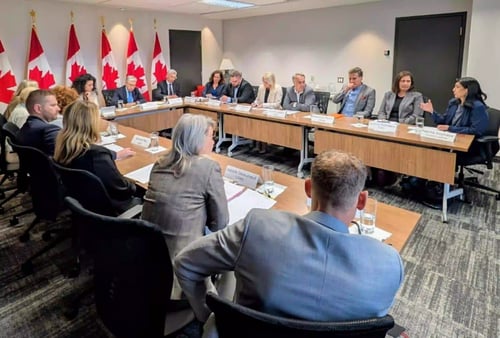Ensuring small businesses’ voices are heard in Budget 2025
As the government prepares to table its first federal budget since spring of 2024, to be announced on November 4th, we shared our pre-budget submission with all MPs and numerous civil servants. Among the many meetings we had, we participated in a roundtable consultation with the Minister of Finance and National Revenue, the Honourable François-Philippe Champagne and we met with the Deputy Minister of Finance.

Corinne Pohlmann (second to the left, starting top right), Executive VP for Advocacy at the Budget 2025 Consultation Roundtable led by Minister of Finance and National Revenue, François Philippe Champagne on Tuesday, August 26, 2025
In our prebudget submission, we highlight many priorities for small firms. For example, the consumer carbon tax is gone, but the government has yet to return more than $600 million in remaining carbon tax rebates to small business owners. Returning that money as quickly as possible will provide some much-needed financial relief for small businesses.
Before the spring election, the federal government promised to scrap the planned increase to the capital gains tax rate, while keeping its plans to increase the LCGE threshold to $1.25-million. The tax increase was halted, however, the threshold increase has yet to be legislated, which we hope will come soon.
Lowering the small business tax rate from 9% to 0% for the near future and raising the deduction threshold to $700,000 are also key recommendations we are making.
To learn more about CFIB’s pre-budget submission’s detailed recommendations, visit our dedicated page.
Continued Efforts to Help SMEs Navigate the Impacts of the CAN-U.S. Tariffs
We continue to highlight the impacts of the ongoing Canada-U.S. trade war on SMEs with MPs by sharing to government our document that captures the experiences of our members dealing with tariffs called Canada-U.S. Trade War: What We Heard from Canadian SMEs in our meetings. This document helps us put pressure on the government to quickly return the money collected through counter tariffs.
The government also announced more money for the Regional Tariff Response Initiative meant to provide smaller businesses with access to repayable and non-repayable loans delivered through the seven Regional Development Agencies (RDAs). For more details on this program, visit our website.
Temporary Foreign Worker Program
Immigration is an issue that is heating up across the country right now. We are currently monitoring the developments and have shared our position with government through 2 consultations. Recent calls to abolish the program outright are misguided and would severely harm many small businesses across the country.
CFIB’s position is driven by our member data — our members have consistently supported the limited but responsible use of the Temporary Foreign Worker Program (TFWP) to fill chronic labour shortages, especially in communities where there are not enough Canadian workers available. The program should be carefully managed and adjusted based on economic conditions and level of unemployment.
For more information on our position on the TFWP, please visit our new webpage: Why Small Businesses Need the Temporary Foreign Worker Program.

